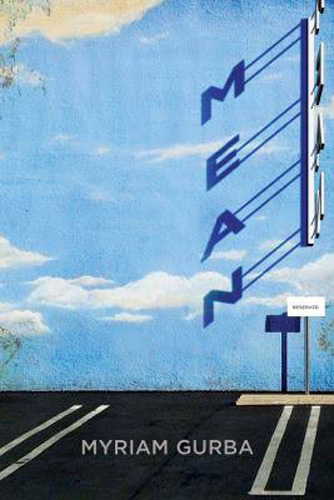Mean
I really like the phrase “the chaos of memory.” My spirit latches onto it and wraps its arms around its queer, hairy legs. The phrase expresses what kind of happens to your brain during and after trauma. Chaos roots itself in memory. My chaos came when a Mexican man sexually assaulted me on a sidewalk in the afternoon sun.
—from “Semester 1998”
I really like the phrase “the chaos of memory.” My spirit latches onto it and wraps its arms around its queer, hairy legs. The phrase expresses what kind of happens to your brain during and after trauma. Chaos roots itself in memory. My chaos came when a Mexican man sexually assaulted me on a sidewalk in the afternoon sun.
—from “Semester 1998”
If humor is our best weapon, Myriam Gurba is toting fully-automatics and taking no prisoners. Honest. Hilarious. Heart-piercing. Politically urgent and necessary.
Mean is memoir by vignette.
Gurba writes chronologic flash essays about coming of age as an immigrant in California in the 80s and attending Berkley in the 90s. A self-proclaimed melo-dramatist, self-defined “Molack”—Mexican mother and Polish father— Gurba begins her story with the construction of racial identities and feminist theory on the Santa Maria schoolhouse playground. An anecdote about forcing a group of boys to climb a chain link back-stop several stories high, to join the author’s girls’ club concludes with a premature razor-sharp insight:
I hoped Steve would injure himself and die so that I wouldn’t have to let him into my club. That had been my strategy. To give his sex an insurmountable initiation. Like the literacy tests given to black folks in the American South before the Voting Rights Act passed.
I was an early-onset feminist.
Gurba does a phenomenal job creating a narrative persona that reflects and holds the reader’s hand while seamlessly dropping into scene. No topic is taboo. Meditations on evil constantly simmer under the surface: “When was the last time you wanted to kill someone but chose to be a bitch instead of a murderer? Have you been called a bitch?”
As Gurba matures, the themes kaleidoscope toward darkness. Structurally, the tight prose becomes interspersed with poetry, almost as if the narrative center cannot hold. Michael Jackson appears at the local mall cruising the toy store. A classmate in her history class molests her daily. An Anne Frank obsession. A local pedophile is arrested. Friends drift in and out of the writer’s life. The white neighbors feed her horrendous Jell-O and casserole. A serious assault while at college, with the perpetrator later convicted of murder, brings guilt, detectives, and deep internal empathy with the victim and a Black Dahlia fetish. All while her sexuality is blossoming under a self-conscious microscope. But there will be no spoilers here. Despite the arias of digression (Which one will she follow? Which one will she return to?), the narrative is so tight, the pages will not turn fast enough.
Although Gurba faces contemporary issues with courage (“I know I can be mean, but I also want to be likable. I just don’t want to be so likeable that anyone wants to rape me.”), and humor (“Some female saints grow beards.”), her real power is unleashed jazz prose, urgent, unique, and insightful:
Since I’m susceptible to attractive book covers, I prowled thrift shop shelves and grabbed books for aesthetic appeal. Sexy sloppy seconds with smooth jackets and pages that had been fingered so hard they’d softened and swollen.
Later in the same vignette, Gurba and a friend discover nudie magazines under a kitchen sink:
I grabbed a magazine and realized boobs were the best thing ever. There were boobs and pussy on almost every page, and the boobs made me feel drunk or like I was on cloud nine. They were so round. Gazing at that much pink stuff made me feel pink and grabby . . . I was ready to ask these women to marry me.
I was eight and knew what I wanted.
I had access to cheap rings at the supermarket.
Gurba offers a prime example of how the nature-nurture argument can be sliced to death with amusing force. Page after page, Mean opens a door to raw discovery by describing these realizations in entertaining and exacting detail. With almost reckless abandon, Gurba enlarges understanding.
Queer, mixed-race Chicana, humorist, and theorist, Gurba has constructed a coming-of-age memoir full of gut punches and belly laughs, culminating in trauma, but never victimization.





